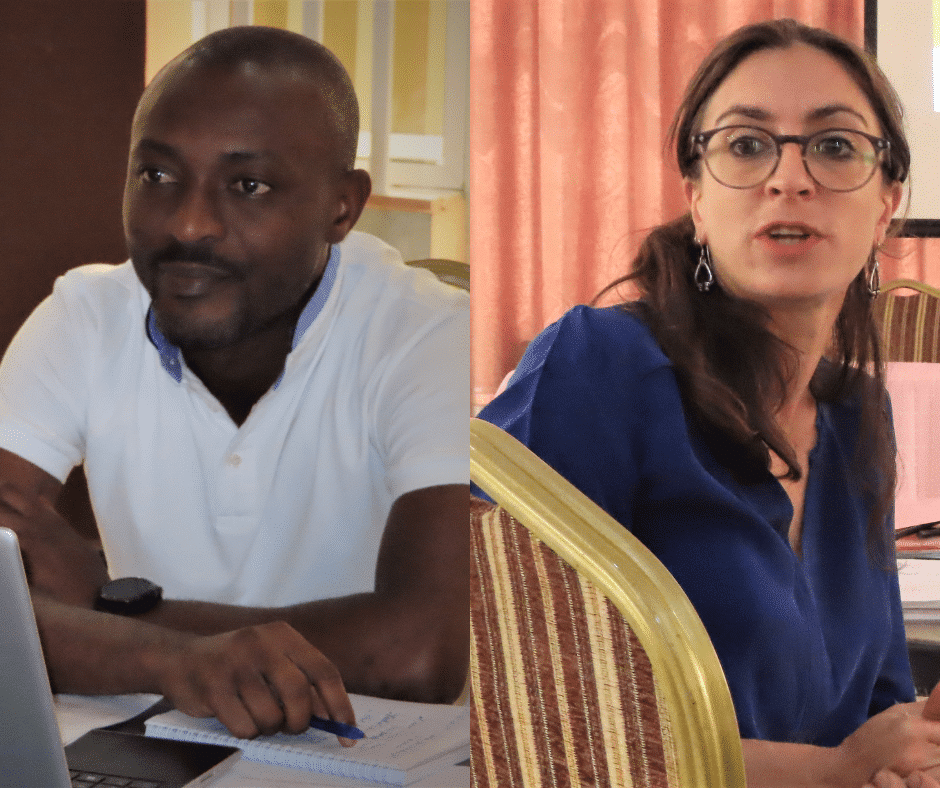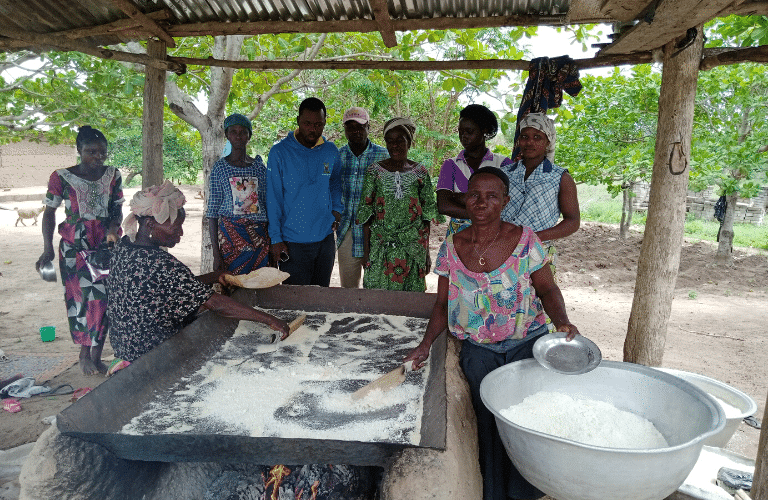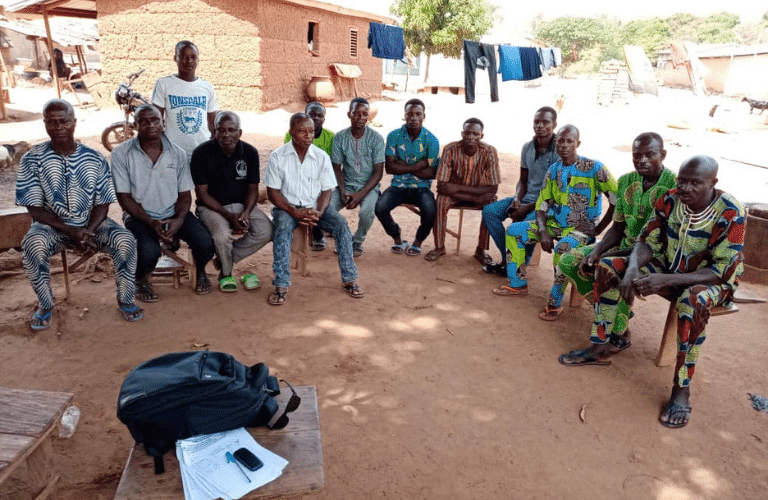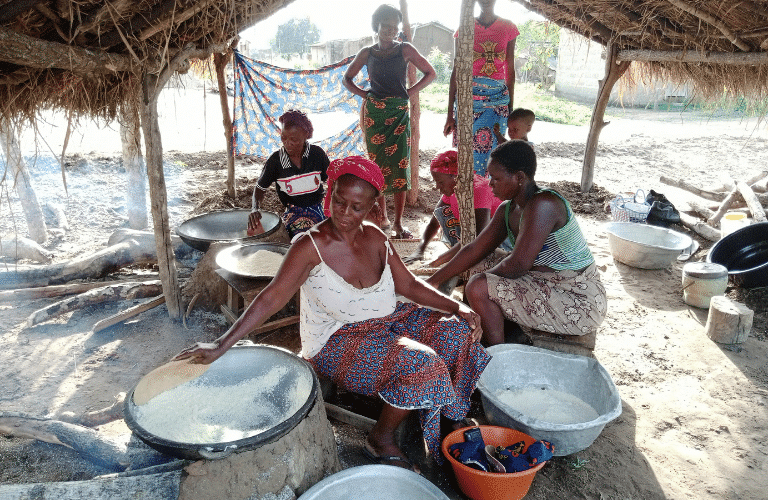Job creation and forest preservation, explaining the issues in Benin
The forested areas of Benin’s Collines département are undergoing serious degradation. A project is currently under way to develop local biomass energy value chains to reduce pressure on the forest and improve the livelihoods of the local communities. Background, issues and impacts.

Joint interview with
Two of the project’s protagonists: Clémentine Laratte, Territories, Climate and Energy Programme Officer, and Fulgence Akaffou, Geres Biomass Energy Officer in West Africa
Question 1/ In the project’s target territory, Collines, the forest basin now produces large quantities of charcoal to supply urban areas. Could you explain the impacts on the territory of this overexploitation?
F.A — Traditionally, households in Benin have always used wood and charcoal as the main fuels to produce energy.
It is important to note that the Collines département in central Benin is a primarily rural area, in the tropical climate zone. Its forest basin represents a huge resource!
Charcoal production in Collines, still uncontrolled to some extent, is estimated at 2668 tonnes per year. With a growing population seeking to earn a living, the forests are under enormous pressure.
More than 90% of households here use wood and charcoal for cooking. Current practices play a part in increasing pressure on forest resources!
Every year, hectares of forest are converted into farmland or grazing areas, or seriously degraded by overexploitation to meet needs for timber, lumber and domestic energy, especially in the cities.
Despite the search for alternatives, other types of fuels cannot, for many economic, social or cultural reasons, compete with traditional fuels, which will continue to be major energy sources for most households in Benin for a long time to come.

It is now understood that poorly controlled and inefficient traditional charcoal production practices (a loose pile of wood covered with leaves and sand, generally known as a chimneyless stack) are contributing to forest degradation without creating any high-quality jobs in the territory.
Question 2: What are the challenges for the project in trying to roll back this degradation? How does it operate?
C.L — To begin with, our key short-term challenge is to improve charcoal production techniques and practices and develop formal, sustainable production chains which are consistent with voluntarist strategies and policies in favour of protection and rational management of forest resources.
In other words, the project is endeavouring both to meet people’s energy needs and to preserve and reconstitute forest cover in the long term.
How? By supporting initiatives to promote reforestation, soil regeneration and development of timber and non-timber forest products.
Question 3: Who are the main local stakeholders driving and implementing this project in Benin?
C.L — The project is based on a partnership with two territorial authorities: the Groupement Intercommunal des Collines (GIC), which co-ordinates the work of the 6 communes in the département, and the Communauté forestière du Moyen Ouemé (CoFoRMo) forest community, which helps the communes to organize the wood energy production chain and puts monitoring mechanisms in place in line with national legislation.
These groupings of local authorities carry out activities in various sectors of local development: basic services, agriculture, herding, economic development, etc.

Question 4: More broadly, what is the role of these groupings in the biomass energy sector within the Collines territory? Can you tell us about this complementary alliance with Geres in this project?
F.A — These groupings, i.e. the Groupement Intercommunal des Collines and Communauté forestière du Moyen Ouémé, play a vital, tangible role. They operate on various fronts, such as:
- Developing forest management plans;
- Carrying out inventories of forest operations;
- Overseeing foresters;
- Setting up rural timber markets;
- Supporting agroforestry and reforestation initiatives;
- Supporting improved stove production chains;
- Conducting studies into alternative biofuels; and
- Establishing forest management mechanisms involving landowners, foresters, local authorities, charcoal producers and so on
C.L — In answer to the question, our project is fully consistent with these initiatives. It liaises with and boosts the capacity of these stakeholders to put together and implement a biomass energy strategy in response to the challenges of protecting biodiversity and combating climate change , by bringing together all the relevant stakeholders (public, private and voluntary sector) in the territory.
Question 5: The beneficiaries of the project include women involved in food processing and catering. What are the risks they currently face and what solutions can you offer to reduce those risks?
F.A — Because of the degradation and increasing scarcity of the resource, it is much harder, particularly for professionals in the food processing sector, to obtain supplies.
On another level, it is unfortunately women and girls who are the most vulnerable: women and men do not have equal access to resources and it is usually women’s job to gather fuel for cooking.
Along with children, women are the most exposed to indoor air pollution due to inefficient cooking techniques.
As a result of this project, women working in food processing and catering are being and will be trained to produce cooking stoves suited to their activities and more energy-efficient than their traditional processes.
From discussions, it is clear that the beneficiaries are enthusiastic about this and keen to get involved in awareness and training activities.
To date, 30 groups (360 members) have already noted a reduction in energy costs as fuel expenditure falls. That’s encouraging and motivating for our teams!

Question 6: Amongst the expected results, you list the creation of skilled, sustainable local jobs related to the energy transition in Collines. Can you tell us a little bit more?
F.A — The development of sustainable production and distribution chains for improved stoves and the promotion of “non-timber” forest products (honey, shea, cashew, etc.) should eventually result in creation of sustainable jobs for local communities. That’s our aim.
To achieve it, we are helping these economic operators, currently working in the informal sector, to organize and put their activities on a more formal footing.
For example, we are now supporting two artisans producing improved stoves on a professional basis, a dynamic network of five women stove sellers, 270 foresters and charcoal producers and two local businesses using and processing non-timber forest products.
Question 7: What can we ourselves do to help you achieve your objectives in this project? How can we support you?
F.A — At Geres, we are now looking to raise additional funds through donations or financial partnerships with a view to achieving these ambitious objectives.
C.L — Our partner, GIC-Collines, is also endeavouring to develop exchanges and co-operative relationships with French territorial authorities.
If you are interested in this project and want to support it, don’t hesitate to get in touch with us for more information!
More info
WOULD YOU LIKE TO TAKE ACTION
AND SUPPORT WHAT WE DO?
Tell us who you are and find your means of action.
